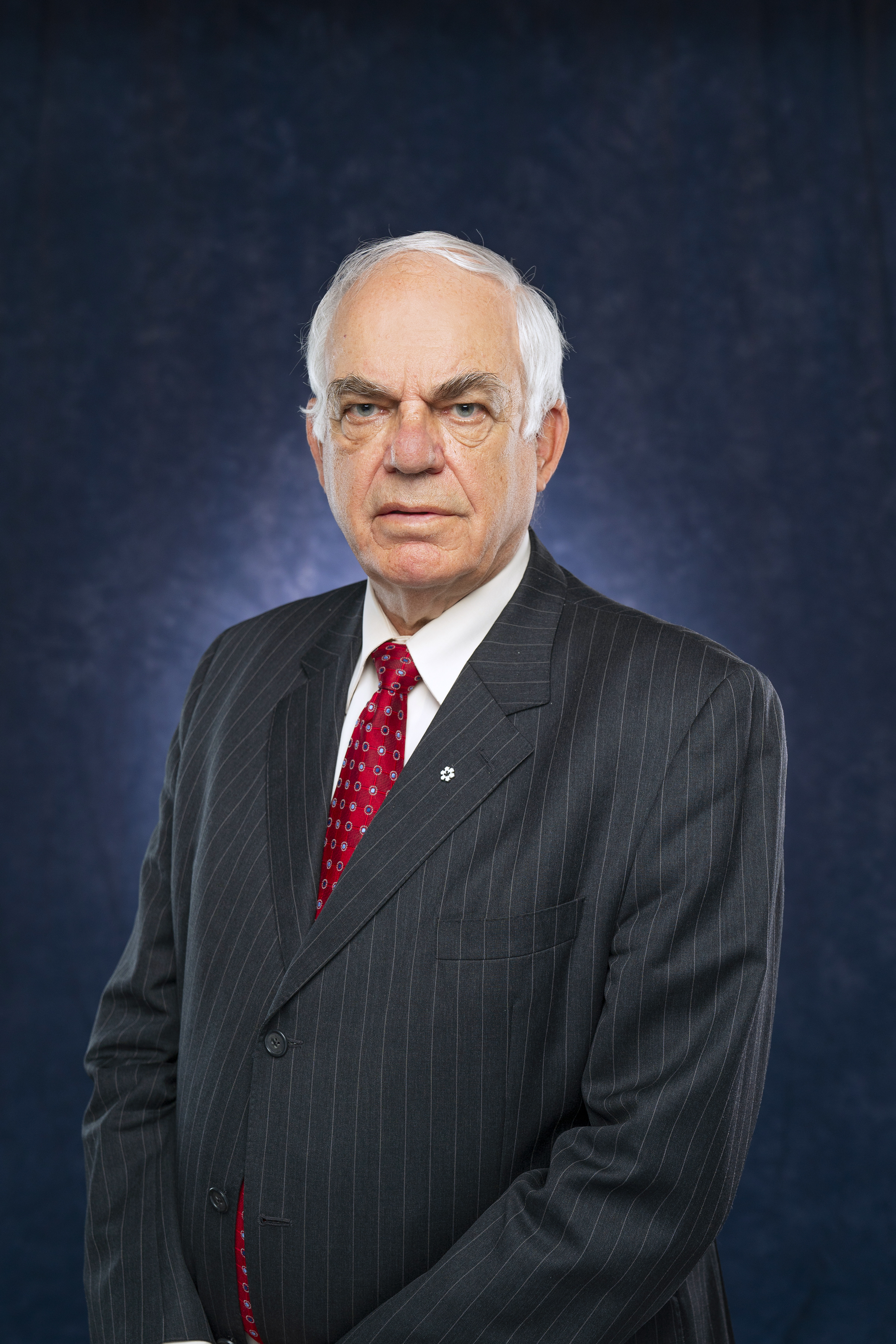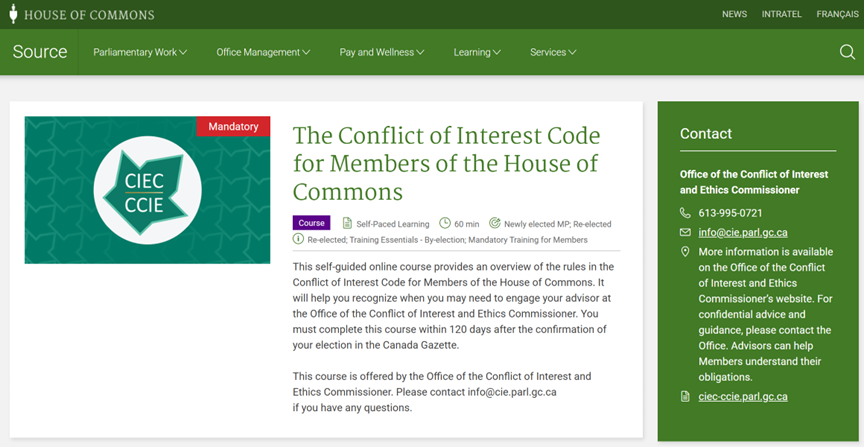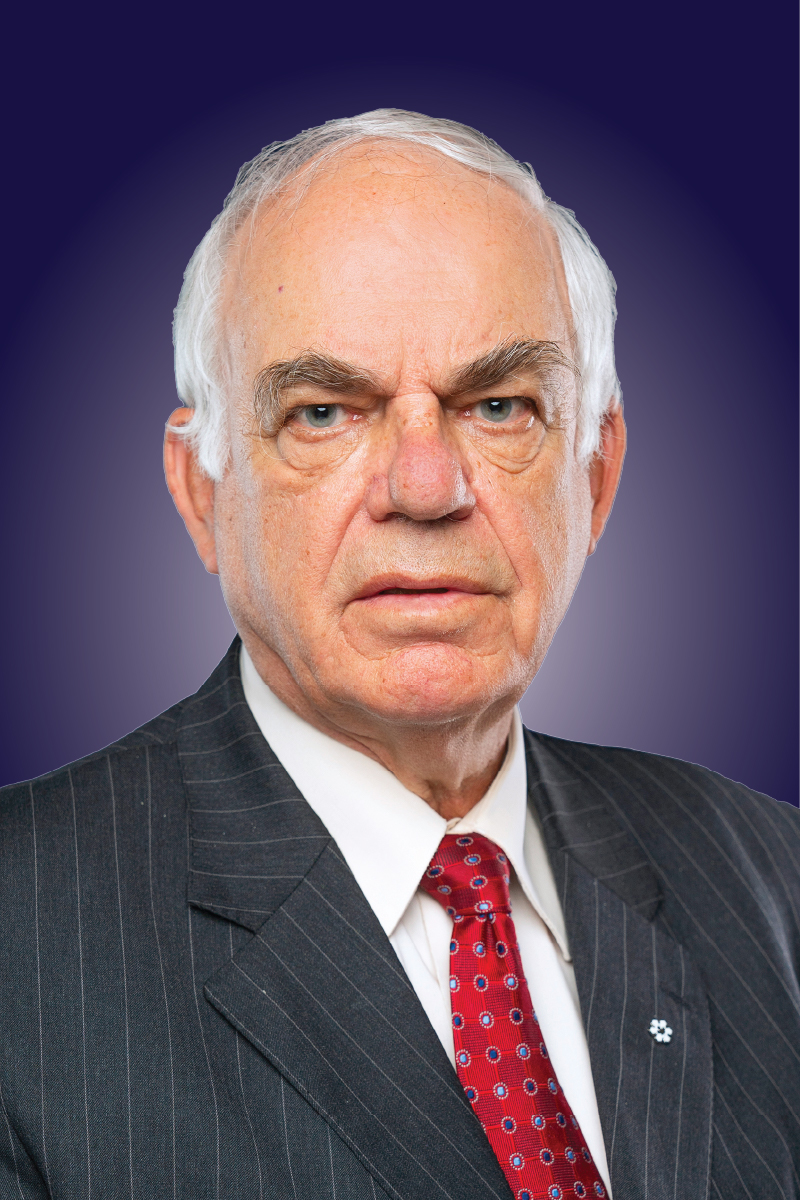COMMISSIONER'S MESSAGE
I am pleased to report on the administration of the
Conflict of Interest Code for Members of the House of Commons in 2024-2025. 
This was my first full fiscal year as part of my seven-year mandate as Commissioner. The activities reported here reflect the approach taken by the Commissioner’s Office in the last year.
That approach focuses on our mandate, and it supports three key objectives.
One, foster public confidence that the actions of elected and appointed federal officials are free from conflicts of interest.
Two, help public officials manage their conflicts of interest so the most competent and qualified people can move in and out of public service without any problems.
Three, examine and report on allegations of conflicts of interest that involve elected or appointed federal officials.
The Commissioner’s Office uses various tools to achieve these objectives, including one-on-one interface with each elected or appointed official, training and educational resources, and our website.
The
Conflict of Interest Code for Members of the House of Commons strikes a balance between confidentiality, to protect Members’ privacy, and maximum transparency, to support accountability. We apply both these concepts in our work.
Confidentiality ensures Members can freely and openly share their issues with us.
Transparency allows us to be as open as possible with Parliament and the public about everything the Commissioner’s Office does. Everyone should understand what we are doing and why we are doing it. This helps ensure the credibility of the Code and its administration.
The Commissioner’s Office is committed to being efficient and making decisions quickly. When there are allegations of wrongdoing, quick resolutions are essential as reputations may be at stake.
Building on the work of the previous year and the principles identified above, we have developed a five-year strategic plan.
We look forward to implementing this approach in the upcoming years and meeting new challenges.
Vision, Mission AND Mandate
Vision
To safeguard public confidence in the integrity of Parliament and government institutions.
Mission
To help elected and appointed public officials avoid conflicts of interest.
Mandate
Administer the Conflict of Interest Code for Members of the House of Commons and the Conflict of Interest Act so as to manage conflicts of interest.
The Commissioner’s Office has identified four priorities in its 2025-2030 Strategic Plan to advance its vision, mission, and mandate:
-
Avoiding conflicts of interest
Improve processes and resources to help public officials manage conflicts of interests efficiently, while supporting transparency and accountability.
Ensure every interaction with public officials is positive, seamless and user-focused, engendering trust and satisfaction.
-
Healthy and fulfilling workplace
Foster a healthy, inclusive work environment where employees always act with integrity. Support diversity, professional development, and hybrid work.
-
Tools, knowledge, and skills
Give employees modern tools and training so they have the knowledge and skills to effectively carry out the mandate of the Commissioner’s Office.
fostering public confidence
A key objective of the Commissioner’s Office is to help Canadians trust that the actions of elected and appointed public officials at the federal level are free from conflicts of interest.
Canadians must feel confident that those officials do not use their public office for private gain. The things they do in their jobs should be to benefit the public, not themselves or someone they know. Competing interests must not interfere with their ability to be fair and objective.
Everything the Commissioner’s Office does—from advising public officials to reporting to Parliament—ultimately aims to foster this public confidence.
This report highlights how it works to build public trust in the activities of elected Members of Parliament. They are subject to the
Conflict of Interest Code for Members of the House of Commons. Members who are ministers or parliamentary secretaries are also subject to the
Conflict of Interest Act.
Snapshot of Members of the House of Commons on March 31, 2025
0 Members
Note: When Parliament is dissolved for a general election, incumbents are no longer
considered Members for the purposes of the Code, and parliamentary secretaries lose
their positions.
Confidentiality and transparency
The two complementary concepts of keeping things private and being open are key to the work of the Commissioner’s Office.
Confidentiality encourages public officials to communicate freely and openly with the Commissioner’s Office, and to ask it for advice when faced with a situation that may put them in a conflict of interest.
When public officials disclose information to the Commissioner’s Office, other than statutorily protected information, most of it is kept confidential. The Office uses this information to help them arrange their affairs to avoid conflicts of interest, and to make sure they are following the rules.
The
Conflict of Interest Code for Members of the House of Commons has strict confidentiality requirements. These allow Members to fully disclose their situation so the Commissioner can give them advice based on complete information.
All their interactions with the Commissioner’s Office are confidential and can only be made public by the Members themselves, not by the Office.
Transparency is a keystone for fostering public confidence.
One of the Code’s stated purposes is to show the public that Members are held to standards that place the public interest ahead of their private interests, and to provide a transparent system so the public can see this happening.
Transparency is built into the Code through its public declaration requirements. Some of the information that Members disclose to the Commissioner’s Office must be posted in a public registry for anyone to see.
The
public registry is a searchable database that can be accessed through the Office’s website. It contains all the information about public officials that the Commissioner is allowed to make public.
|
Public registry activities |
Postings |
Views
|
2024-2025
| 1,316
| 170,628
|
Five-year average
| 1,261
| 101,438
|
The public registry contains information on sitting Members. Their information stays in it until they leave elected office. When a federal election is called, incumbents are no longer considered Members for the purposes of the Code, so the Commissioner’s Office removes their information under the Code from the registry.
The Commissioner’s Office is transparent about its own activities. It publishes quarterly statistical reports that contain data on what it is doing and how it is meeting its service standards.
Reporting to Parliament
The Commissioner has a duty to report to Parliament, testify before parliamentary committees, and answer questions from Parliament. As an independent Officer of the House of Commons, he reports to Parliament directly, not through a minister.
By March 31 each year, the Commissioner is required to send a list of sponsored travel under the Code to the Speaker of the House of Commons for tabling. Under subsection 15(1) of the Code, sponsored travel is any travel worth more than $200 that is not fully paid by the government, a political party, a recognized parliamentary association, or by Members themselves. The Commissioner could not send the
List of Sponsored Travel 2024 by March 31, because the House of Commons was not in session. Parliament was prorogued in January then dissolved in March for a general election.
By June 30 each year, the Commissioner sends a report on the administration of the
Conflict of Interest Code for Members of the House of Commons to the Speaker of the House of Commons for tabling.
The Commissioner reports on inquiries (investigations) under the Code to the House of Commons. The Commissioner did not issue any inquiry reports in 2024-2025.
The Commissioner’s Office sends communiqués to parliamentarians about its reports and other activities. It sent four of these in 2024-2025.
Committee oversight
The House of Commons Standing Committee on Procedure and House Affairs is responsible for the Code.
The Commissioner needs the Committee’s approval for guidelines or forms related to the Code. If the Committee approves any such documents, it reports them to the House. The Commissioner’s Office can only use them if the House agrees with the Committee’s report.
The House of Commons Standing Committee on Access to Information, Privacy and Ethics has oversight responsibility for the Commissioner’s Office. The Committee reviews its annual spending estimates, and matters related to the Commissioner’s reports under the
Conflict of Interest Act.
Committee appearances in 2024-2025
|
Date | Description |
April 16, 2024
| House of Commons Standing Committee on Access to Information
Privacy and Ethics, Main Estimates 2024-2025
Commissioner Konrad von Finckenstein appeared with
Sandy Tremblay, Director, Corporate Management Melanie Rushworth, Director, Communications, Outreach and Planning
|
June 4, 2024
| House of Commons Standing Committee on Access to Information
Privacy and Ethics, Compliance of a Minister with the Conflict of Interest Act
Commissioner Konrad von Finckenstein appeared with
Lyne Robinson-Dalpé, Director, Advisory and Compliance
|
August 8, 2024
| Standing Committee on Public Accounts Report 1, ArriveCAN of the 2024 Reports of the Auditor General of Canada
Commissioner Konrad von Finckenstein appeared with Michael Aquilino, Legal Counsel |
September 16, 2024
| Standing Committee on Industry and Technology Recent Investigation and Reports on Sustainable Development Technology Canada
Commissioner Konrad von Finckenstein appeared with Michael Aquilino, Legal Counsel |
September 17, 2024
| Standing Senate Committee on National Finance Main Estimates 2024-2025
Commissioner Konrad von Finckenstein appeared
|
September 16, 2024
| House of Commons Standing Committee on Procedure and House Affairs Forms and Procedural and Interpretative Guidelines from the Conflict of Interest and Ethics Commissioner (in camera meeting)
Commissioner Konrad von Finckenstein appeared with Lyne Robinson-Dalpé, Director, Advisory and Compliance
|
October 21, 2024
| House of Commons Standing Committee on Public Accounts Report 6, Sustainable Development Technology Canada, of the 2024 Reports 5 to 7 of the Auditor General of Canada
Commissioner Konrad von Finckenstein appeared with Michael Aquilino, Legal Counsel
|
Public communications
In support of transparency, the Commissioner’s Office communicates as openly with the public as it is allowed to under the
Conflict of Interest Code for Members of the House of Commons and the
Conflict of Interest Act. It shares as much information as it can, and in different ways.
For example, it posts information on its website.
|
Website usage |
2024-2025 |
Users
| 127,500
|
Page views
| 280,000
|
This year, the website attracted twice as many users and had twice as many page views as the year before. Website traffic rose in the last two quarters.
The Commissioner’s Office designed and built a new website so different users can quickly and easily find the information they are looking for. The content is written in plain language to make it more accessible. The website will be launched in 2025-2026.
The Commissioner’s Office uses social media to share information about its activities and updates from the public registry that may be of interest to journalists, academics, Canadian and international ethics practitioners, and others.
Social media usage |
X
@EthicsCanada
@EthiqueCanada |
LinkedIn
@ethics-ethique-canada |
Posts
| 79
| 80
|
Followers
| 4,357
| 1,052
|
It responds to journalists and members of the public who want information by telling them as much as possible about how the Code and the Act work, and directing them to the public registry when appropriate.
|
Media inquiries in 2024-2025 |
Public inquiries in 2024-2025 |
114 emails and and phone calls from members of the media
-
Over 85% were questions about a specific elected or appointed official, or the status of a current case file
- About 10% were general inquiries about the Office’s role and mandate
- 5% were about the Commissioner’s investigation reports
|
400 emails and phone calls from members of the public - 80% did not fall within the Commissioner’s mandate and were redirected
- 20% were general inquiries about the role of the Office or complaints about a particular official. Some were shared with the Investigations division for follow-up
|
The Commissioner’s Office also gives presentations about its work to interested audiences that in 2024-2025 included:
- Dalhousie University, Ethics in Action course
- Carleton University, Ethics in Political Management course
- Many Facets of Parliament, a seminar for parliamentary employees
- Montreal Integrity Network, a network of professionals who help organizations develop ethics and compliance programs
Connecting with others
The Commissioner’s Office works with other organizations to stay updated on and share best practices. This collaboration supports its objective of fostering public confidence that elected and appointed officials’ actions are free from conflicts of interests.
It continues to coordinate information sharing within the Canadian Conflict of Interest Network (CCOIN) of federal, provincial, and territorial conflict of interest commissioners.
In September 2024, the Commissioner, a Legal Counsel and the Director of Communications, Outreach and Planning attended CCOIN’s annual meeting, hosted by Ethics Commissioner Ariane Mignolet in Quebec City.
The Commissioner’s Office is a member of the
Ethics Practitioners Association of Canada (EPAC). With members from government, business, voluntary sector, and the academic community, EPAC promotes ethical practices in organizations, and supports ethics practitioners across Canada.
The Commissioner’s Office is an active member of two international ethics organizations.
The Réseau francophone d’éthique et de déontologie parlementaires (RFEDP) promotes exchanges between parliaments and entities in the Organisation internationale de la Francophonie [link in French only] that are interested in ethics and codes of conduct.
RFEDP activities in 2024-2025:
- The Commissioner, the Director of Advisory and Compliance, and the Director of Communications, Outreach and Planning participated in its 2024 Annual General Meeting, held in Brussels.
- As a member of the RFEDP’s Bureau, the Director of Advisory and Compliance participated in a May 2024 seminar in French Polynesia as a speaker and moderator. It was part of an ongoing RFEDP project to train parliamentarians in the Francophonie on avoiding conflicts of interest. In July, she attended a meeting of the Bureau in Montreal, while participating in bilateral discussions and committee meetings during the annual meeting of the
Assemblée parlementaire de la Francophonie[link in French only].
The
Council on Governmental Ethics Laws (COGEL) is a U.S.-based organization of government ethics practitioners.
COGEL activities in 2024-2025:
- Office representatives attended COGEL’s 2024 conference, held in Los Angeles, in December 2024, and joined several virtual events during the year.
Other international outreach activities:
- In May 2024, the Commissioner’s Office gave input to Global Affairs Canada for its response to a questionnaire on the G20 Anti-Corruption Working Group Accountability Report.
- In March 2025, an Office representative attended the 2025 OECD Global Anti-Corruption and Integrity Forum (hosted by the Organisation for Economic Co-operation and Development).
helping elected officials manage conflicts of interestAnother key objective of the Commissioner’s Office is to help Members manage their conflicts of interest so the most competent and qualified people can move in and out of public service without any problems.
Like all experienced people, these individuals may face conflicts between public and private interests. The Commissioner’s Office helps them avoid and manage such conflicts by giving them information about the Code’s rules.
It also guides them on how to follow those rules and submit required information.
In October 2024, the Commissioner’s Office conducted a confidential and anonymous survey of Members. It is using the results to guide how it communicates and engages with them. By comparing the results with those of a similar survey it ran in 2022, it can measure progress in meeting Members’ needs. The Commissioner’s Office shared the main findings of the 2024 survey with all Members.
Personal advice
The Commissioner’s Office helps Members follow the rules that apply to them, by giving them information and advice when they need it, and by answering their questions promptly.
It assigns each Member an advisor who works with them throughout their time in office.
Their advisor helps them understand and follow the rules and meet the Code’s reporting requirements. Members can ask their advisor for advice at any time.
The Commissioner’s Office reaches out to all Members soon after they are elected or re-elected. It aims to contact each Member personally within three days after notice of their election or re-election appears in the
Canada Gazette.
To make sure the advice it gives Members is consistent, the Commissioner’s Office tracks the topics they ask about, so it can identify training needs and spot trends that might impact its workload.
When asked, the Office explains the Code’s requirements to candidates running for election to the House of Commons.
|
Breakdown of advice by topic |
2024-2025 |
Gifts and other benefits
| 99
|
Letters of support and fundraising
| 50
|
Material changes
| 259
|
General obligations
| 159
|
Total
|
567 |
Guidance on reporting requirements
To achieve and maintain compliance with the Code’s disclosure provisions, Members must meet various reporting requirements.
This means giving the Commissioner’s Office detailed personal and financial information about themselves and their family members.
The Commissioner’s Office keeps most of that information private, and only uses it to determine what Members need to do to ensure they are following the rules. As required by the Code’s public declaration provisions, the Commissioner’s Office makes some of it public, by posting in the public registry. This supports transparency and accountability.
Advisors walk new and re-elected Members through the initial compliance process under the Code. This process is an opportunity for them to familiarize themselves with the rules and address potential issues.
Step 1: Each Member must give the Commissioner’s Office detailed personal and financial information about themselves and their family, by filling out a Disclosure Statement within 60 days after their election is confirmed.
Step 2: Their advisor reviews this information and helps them organize their affairs to avoid conflicts of interest.
Step 3: The advisor prepares a summary of the information in the Disclosure Statement. The Member then has 60 days to review, sign and return this Disclosure Summary.
Step 4: The Commissioner’s Office posts the Disclosure Summary in the public registry, and the initial compliance process is over.
The Commissioner’s Office helps Members meet other reporting requirements during their whole time in elected office. They must tell it about the following things, within certain deadlines. Some of this information is made public.
-
Material changes (any changes to the information in their Disclosure Statement).
-
Gifts or other advantages worth $200 or more that they or their family members accept. They must publicly declare multiple gifts received from one source in a 12-month period with a total value of $200 or more.
-
Sponsored travel. Any travel worth more than $200 that is not fully paid by the government, a political party, a recognized parliamentary association, or by the Members.
-
Abstentions. If present when a matter in which they have a private interest is being debated or voted on in the House of Commons or by a committee they are part of, Members must disclose the general nature of the interest to the Clerk of the House of Commons. The Clerk will send the disclosure to the Commissioner, who will post it in the public registry. If they have a private interest that could be affected by their parliamentary work in other situations, they must inform the party concerned about the general nature of the interest, and send a written notice about it to the Commissioner, who will post it in the registry.
|
Public declarations by Members in 2024-2025 |
2024-2025 |
Disclosure summaries
| 327
|
Gifts and other benefits
| 39
|
Material changes
| 64
|
Sponsored travel
| 20
|
Private interest
| 1
|
Total
|
451 |
Members must also complete an
annual review. Each year, they must file a new Disclosure Statement with the Commissioner’s Office, which contacts them to launch the review process. In 2024-2025, 180 annual reviews were completed.
Education and training
The Commissioner’s Office gives Members education and training on the Code’s conflict of interest rules and other requirements. To help them understand and retain important information, it gives them the same information more than once, and in different ways.
In the summer of 2024, the Commissioner’s Office launched an online course on the Code, through the House of Commons intranet site. The course is bilingual, accessible, mobile-friendly, and easy to use. It features interactive scenarios that give Members practical learning experiences.
This course was developed in response to a March 2023 amendment to section 32 of the Code, which made training on it mandatory for all Members. The Commissioner is now required to offer individualized training that includes educational scenarios, and Members must complete it within 120 days after their election is confirmed.
While Members’ staff are not subject to the Code, they can play an important role in helping Members meet its requirements and are encouraged to complete the course.
Under subsection 26(4) of the Code, the Commissioner occasionally issues educational documents called “advisory opinions” to help Members understand how the Code applies in specific situations. No advisory opinions were issued in 2024-2025.
Screengrab of the online course for Members

REPORTING ON CONFLICTS OF INTEREST
A third key objective of the Commissioner’s Office is to examine and report on allegations of conflict of interest that involve federal public officials.
The Commissioner investigates Members when he has reasonable grounds to believe that they may have contravened the
Conflict of Interest Code for Members of the House of Commons, and reports publicly on those investigations.
The Commissioner can start an investigation (called an inquiry) under the Code in one of three ways:
- When asked to investigate by a Member of the House of Commons who has reasonable grounds to believe that another Member has contravened the Code.
- When directed to by the House of Commons.
- On his own initiative if the Commissioner has reasonable grounds to believe, based on information from various sources, that a Member may have contravened the Code.
There are no penalties when the Commissioner finds in an inquiry that a Member has contravened the Code. He may recommend appropriate sanctions, but it is up to the House of Commons to impose any sanctions.
Inquiry reports are made public on the website of the Commissioner’s Office, and in the public registry. They are educational tools that can help prevent future conflicts of interest. They also support transparency and accountability.
The Commissioner did not issue any inquiry reports in 2024-2025.
Case files
The Commissioner’s Office sometimes receives information alleging that a Member may have contravened the Code. The information might come from another Member, media reports, complaints from members of the public or other sources.
When it gets such information, it may open a case file and conduct an initial review. Some of these reviews may lead to inquiries. When the Commissioner finds an inquiry is not warranted, the case file is closed.
Total case files: 0
Breakdown of case files
|
Subject of each case file |
Current or former minister and parliamentary secretaryCurrent or former Member of the House of Commons | 3
|
Person not subject to the Code
| 0
|
|
Source of these case files |
Member of the House of Commons
| 0
|
Media
| 0
|
Member of the general public
| 3
|
Within the Office
| 0 |
|
Nature of the concern |
Furthering a private interest (section 8 of the Code)
| 3
|
Using influence (section 9)
| 0
|
Required disclosure of information (sections 20 to 24
| 0
|
Attempting to engage in prohibited activities (section 11)
| 0
|
Sponsored travel (section 15)
| 0
|
| Gifts and other advantages (section 14) | 0
|
MANAGING the Commissioner's office
A team of 51 employees supports the Commissioner. They are experts who specialize in areas like compliance, law, communications, corporate management, investigations, and parliamentary relations.
Under the Commissioner’s leadership, employees handle the daily tasks of administering the
Conflict of Interest Code for Members of the House of Commons and the
Conflict of Interest Act. They make sure the processes and structures are in place to support their administration.
They also work on other important files like compliance with the
Employment Equity Act and the Accessible Canada Act. In September 2024, the Commissioner’s Office released its Pay Equity Plan. In December, it released its
2024 Accessibility Progress Report.
The Commissioner provides overall direction, and makes the decisions that need his input and approval. He works closely with other members of the Office’s Senior Management Committee.
Conflict of Interest and Ethics Commissioner's Office

Hon. Konrad W. von Finckenstein, C.M., K.C.,
Commissioner
Advisory and Compliance

Lyne Robinson-Dalpé,
Director
Investigations and Legal Services

Martine Richard,
Senior General Counsel
Communications, Outreach and Planning

Melanie Rushworth,
Director
Corporate Management

Sandy Tremblay,
Director
The Commissioner’s Office devoted a lot of resources to two major projects in 2024-2025.
It partnered with House of Commons Digital Services to build a new website.
The site supports one of the focus areas identified in its 2025-2030 Strategic Plan: making sure everyone has a user-friendly experience when they interact with the Commissioner’s Office.
Drawing on user surveys and testing, it was designed with the needs of users in mind. It will feature a simple structure that will be easy to navigate, and plain-language content. It will also be mobile-friendly.
Special sections for Members of the House of Commons, ministers and parliamentary secretaries, reporting public office holders, and public office holders will help these users quickly and easily find information about all the rules that apply to them. The site will also address the information needs of journalists, ethics practitioners, the academic community, and members of the public.
The Commissioner’s Office expects it to launch in 2025-2026.
The other major project was a move to a new workspace. Having previously reduced its footprint from two floors to one, the Commissioner’s Office now occupies space that was purpose-built to better meet operational needs and accessibility requirements.
The new workspace is the first of its kind among parliamentary entities. It features larger and more flexible meeting spaces, some with sound masking technology. It incorporates new technologies that can accommodate evolving work styles and allows more employees to work collaboratively on-site. All perimeter doors and inside amenities are fully accessible.
The Commissioner’s Office partnered on this project with the House of Commons Administrative Services, the Sergeant-at-Arms, the Parliamentary Protective Service, and Public Services and Procurement Canada.
To make sure it has the right positions and the right people in them to support its mandate, the Commissioner’s Office ran five staffing processes in 2024-2025. No employees left.
The Office’s financial statements are audited each year by an independent external auditor. Its financial information for 2024-2025 is outlined in the Appendix.
APPENDIX: financial resources summary
(thousands of dollars)
|
Program Activity
| 2023-2024 |
2024-2025 |
Alignment to Government
of Canada Outcomes |
Actual Spending
| Main
Estimates |
Total
Authorities
| Actual Spending |
Administration of the Conflict of Interest Act and the Conflict of Interest Code for Members of the House of Commons
| 6,875
| 7,708
| 7,708
| 7,594
| Government Affairs |
Contributions to employee benefit plans
| 839
| 867
| 939
| 939
|
|
Total spending
|
7,714
|
8,576
|
8,647
| 8,533
|
|
Plus: cost of services received without charge
| 1,017
| N/A
| N/A
| 918 |
| Net cost of department
|
8,731
|
8,576
|
8,647
| 9,451
|
|
The budget process for the Commissioner's Office is outlined in the Parliament of Canada Act. Each year, the Office estimates how much money it will need for the next fiscal year. The Speaker of the House of Commons reviews this estimate and sends it to the President of the Treasury Board, who presents it to the House along with the Main Estimates (the Government of Canada's budget) for that fiscal year. The Standing Committee on Access to Information, Privacy and Ethics reviews and reports on the Office’s effectiveness, management and operations, and its spending plans.
The figures in this summary have not been audited. Complete audited financial statements will be posted on the Office's website.

